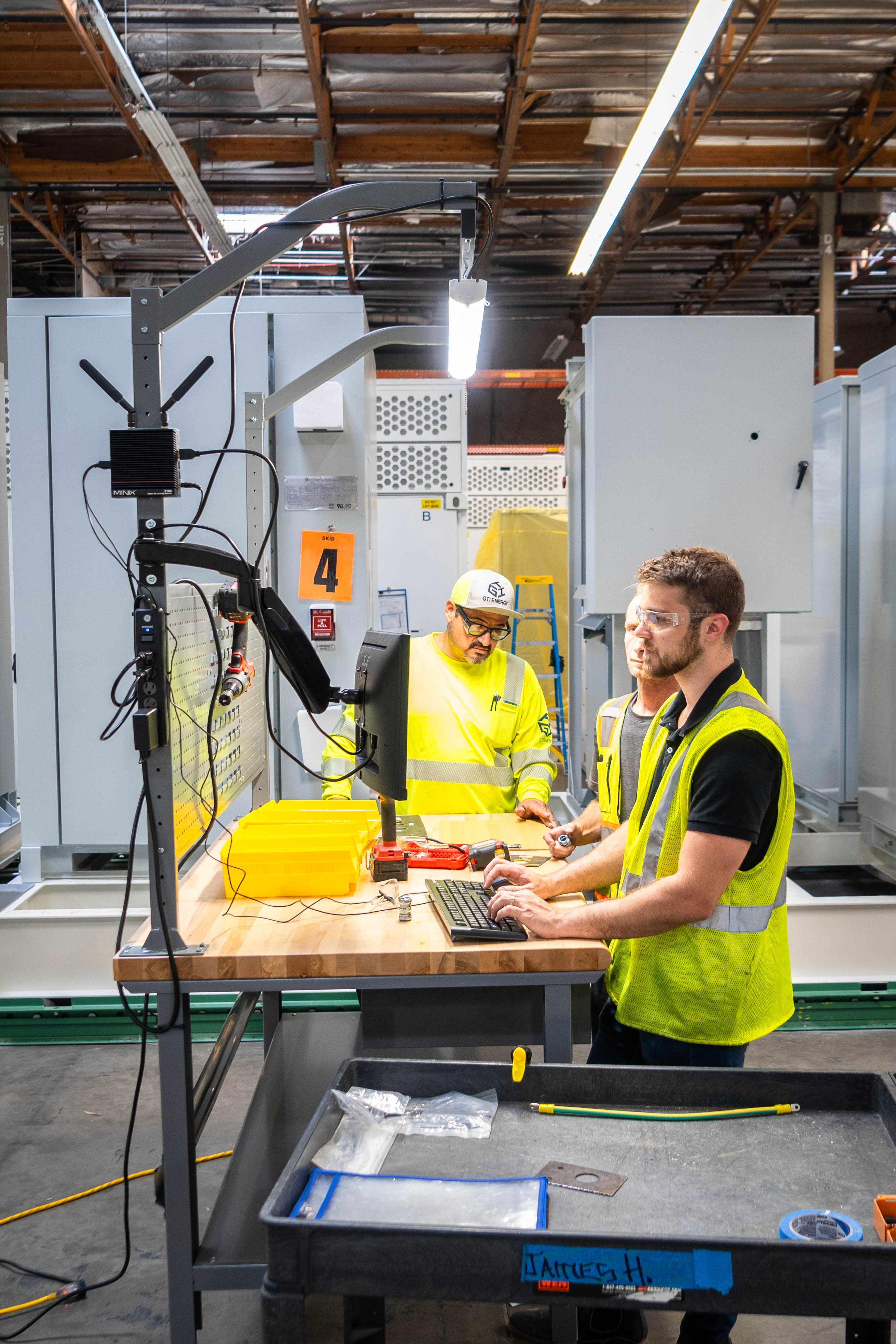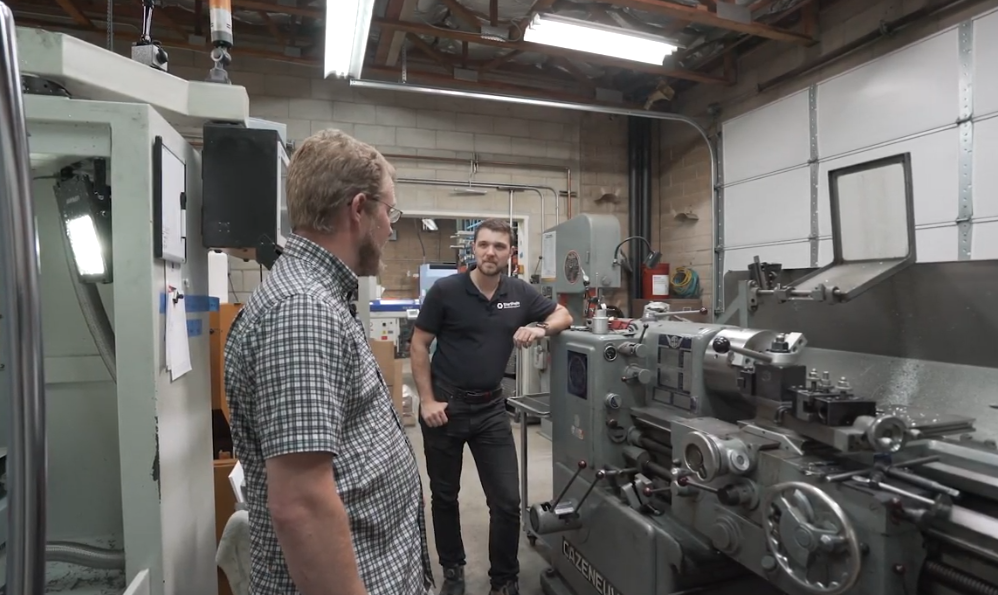
Unleashing Efficiency: Cloud ERP for Manufacturing Companies
In order to stay ahead of the competition in the manufacturing industry, it's not enough to just have efficient production processes.
Manufacturing companies need a comprehensive system that seamlessly integrates various aspects of their supply chain operations and beyond.
This includes but is not limited to:
- Inventory management
- Production scheduling
- Supply chain coordination
- Project management
- Accounting
- Financial tracking

Cloud-based ERP (Enterprise Resource Planning) solutions, such as StartProto, are the game-changer that can provide this integration. By leveraging the cloud, manufacturing companies can bid farewell to the limitations of on-premises software and embrace a dynamic solution that grows with their complex business processes.

Moreover, the cost savings associated with using cloud ERP software for manufacturing are substantial. The traditional barriers of hefty upfront investments from vendors of cloud ERP systems are being upended by newer pay-as-you-go subscription models, which ensure manufacturers of all sizes can access powerful tools without straining their budgets.
Read on for an exploration of how modern cloud ERP systems reshape manufacturing, supply chain, and distribution management landscapes.
What Is Manufacturing ERP Software?
In a manufacturing business, different departments — sales, production, inventory management, purchasing, finance, and more — must work together smoothly for your business to run efficiently with high Overall Equipment Effectiveness (OEE).
Manufacturing ERP software is like a central nervous system for your business. It helps you manage and coordinate all the important aspects of manufacturing in one place. It handles tasks like planning and scheduling production, tracking inventory levels, managing orders and suppliers, and handling financial transactions.
Think of it as a powerful tool connecting different parts of your business, ensuring everyone has the right information at the right time. For example, if a customer places an order, the software will update the inventory levels, automatically schedule production, and keep track of the cost and progress of manufacturing the product.
With manufacturing ERP software, you can:
- Streamline your supply chain operations
- Ensure accurate inventory management
- Boost quality control
- Reduce errors
- Increase productivity
- Optimize production processes
- Improve customer satisfaction
- Analyze data to identify bottlenecks
- Make better decisions with real-time insights

In simpler terms, Manufacturing ERP software is like a smart assistant that helps your manufacturing and business processes run smoothly and seamlessly.
The Current Approach Used by Manufacturing and Distribution Businesses
There is a place for centralized information, but it’s becoming less and less useful in modern times.
You may have an old computer in the back of your office that keeps old records, Quickbooks reports, and stale Excel spreadsheets. What once started as groundbreaking technology a few decades ago now seems inefficient and even outright irritating to use.
The Downside of Spreadsheets and Paper for Small and Midsize Businesses
Those office late nights camped around the blue glow trying to make updates before payroll goes out are not just the cost of doing business. They’re a cost your business is paying by sticking with the status quo.
Although we can’t necessarily fix all the paperwork you do in a day, one of the benefits of modernizing your solutions is more automated systems, fewer reports, and a lot more time spent off the clock.
One of the most important benefits of modern technology is access to everything via the cloud. Anytime anywhere access means less time chained to old office desktops and more flexibility about how and where you manage your files.
This is why StartProto created a cloud-based ERP system that incorporates genuinely enjoyable — and convenient — software.

Why the Cloud Gives Your Shop a Competitive Advantage
Cloud-based ERP systems provide a new sense of agility in the manufacturing industry. They also make it easier to adjust and refine the systems for the future. Innovative technology isn’t slowing down any time soon, either.
Today’s cloud-based ERP for manufacturing may also be antiquated within another few decades, but with cloud computing, it’s become a lot easier to roll out new updates and mediate the need for an entirely new setup.
Because cloud ERP systems are also well-equipped to customize and scale, you gain significant potential to grow your workforce and add layers to your process as your company expands (and adopts more software systems and integrations). Moreover, it allows access outside the office. You can plugin from home, out of town, and on the road.
These are just a few of the reasons cloud-based systems are becoming a top necessity in the manufacturing industry, with more than 70% listing it as a top priority in recent years.
Current cloud technology is also notable for adaptive security, making it more difficult for outsiders to break in and tap into the system. For large-scale corporations, this has been a paramount concern with the growing tensions around cyberattacks on US soil, but it can also benefit and protect even small, localized job shops.

6 Benefits of a Cloud ERP For Manufacturing
Cloud-based ERP systems for manufacturing companies have given small and midsize businesses — from small fabricators to specialty prototyping shops and CNC job shops — new power in the manufacturing supply chain.
Here are some of the key advantages:
1. Accessibility and Flexibility
Today’s top ERP systems for manufacturing companies dramatically increase access to your manufacturing data and operations. Everyone from the owner to the production manager, engineers, or machinists can see the status of jobs, access needed instructions, and look ahead in the schedule from anywhere with an internet connection.
This flexibility allows you to monitor and manage your manufacturing processes remotely, whether you're at the office, on the shop floor, or even on the go. It also enables collaboration among team members across different locations.
2. Cost Savings
Cloud-based ERP software eliminates the need for expensive on-premises infrastructure and IT maintenance. You don't have to invest in servers, hardware, or software licenses, as everything is hosted and managed by the software provider. This significantly reduces upfront costs and ongoing expenses, making it a more affordable option for small and medium-sized businesses.
3. Scalability
As your manufacturing business grows, cloud ERP systems for small manufacturing companies can easily scale up to accommodate your needs. You can add or remove users, increase storage capacity, or expand functionality without significant disruptions. The software provider takes care of the technical aspects, ensuring that the system can handle your evolving requirements.
4. Automatic Updates
Cloud software providers regularly update their platforms with new features, enhancements, and security patches. These updates are automatically deployed in the background, saving you the hassle of manual installations and ensuring that you have access to the latest tools and functionalities. It also helps keep your manufacturing operations up to date with industry trends and best practices.
5. Data Security and Backup
Cloud manufacturing software providers invest heavily in robust security measures to protect your data. They employ encryption, firewalls, user access controls, and other safeguards to ensure your manufacturing information's confidentiality, integrity, and availability. Additionally, cloud software automatically backs up your data, reducing the risk of data loss due to hardware failures or disasters.
6. Integration and Collaboration
Not all solutions have a robust API for integrations, but the best ERP software for manufacturing will also integrate with other business systems such as accounting, CRM (Customer Relationship Management), and even supply chain management and inventory management tools. This integration streamlines data exchange, eliminates manual data entry, and enables seamless collaboration across different departments.
Integrations empower manufacturing businesses to leverage advanced technology without extra administrative and infrastructural burdens, enabling them to focus on their core operations and drive growth.
Get started for free now.
7 Criteria For Selecting ERP Solutions For Manufacturing
When selecting ERP systems for manufacturers, companies should consider the following criteria:
1. Industry-Specific Functionality
Look for an ERP that offers industry-specific features and functionality tailored to the manufacturing sector.
Consider your specific manufacturing processes, such as assembly, production scheduling, make-to-order, make-to-stock, or engineer-to-order, and ensure the software can support and optimize those production processes effectively.
2. Scalability and Flexibility
Choose a flexible ERP system for manufacturing companies of varying sizes. You’ll want a solution that can scale as your business grows.
Consider your long-term goals and evaluate whether the software can accommodate increasing production volumes, new product lines, additional facilities, or international expansion.
Ensure the software can be customized to fit your unique business requirements without extensive development.
3. Integration Capabilities
The best ERP for manufacturing will seamlessly integrate with your existing systems, such as CRM (Customer Relationship Management), PLM (Product Lifecycle Management), MES (Manufacturing Execution System), or SCM (Supply Chain Management).

This allows for smooth data flow between different systems, eliminating duplicate data entry and ensuring accurate and real-time information across the organization.
4. User-Friendliness and Ease of Implementation
Consider the ease-of-use of each of the ERP systems for manufacturers that you’re comparing. Look for a system with an intuitive user interface and comprehensive training and support options that will reduce the learning curve for your employees.
Additionally, assess the implementation process, including data migration, financial management, system configuration, financial management, sales management and user adoption, to ensure a smooth transition without significant disruptions to your operations.
5. Robust Reporting and Analytics
When selecting an ERP for manufacturing industry needs, ensure it provides robust reporting and analytics capabilities.
It should offer a wide range of pre-built reports and customizable dashboards, allowing you to monitor key performance indicators (KPIs), track production efficiency, analyze costs, and make data-driven decisions.

Advanced analytics features like predictive analytics can also help optimize production processes through planning and forecasting.
6. Quality and Compliance Management
For industries with strict quality management, control, and compliance requirements, ensure your preferred cloud ERP systems include full quality control and management, control and management features, regulatory compliance tracking, and traceability.
Look for certifications or industry-specific compliance features that align with your business needs, such as ISO 9001 or FDA compliance for medical devices.
7. Vendor Reputation and Support
Evaluate the reputation and track record of the other ERP system vendor. Consider factors like their financial stability, industry experience, customer satisfaction, reviews, and references.
Additionally, assess the quality of their support services, including technical support, training, and ongoing system maintenance.
By considering these selection criteria, shops can select an ERP for manufacturing that aligns with their specific needs, streamlines their operations, and supports their long-term growth objectives.
Price Range Considerations for Enterprise Resource Planning Software Systems
The price range and the average cost of an ERP for manufacturing can vary significantly based on various factors, including the company's size, the business's specific requirements, the level of customization needed, and the vendor's pricing structure.
Here's a general overview of the price range and average cost points for common manufacturing ERP software on the market:
Small Business Solutions
These are typically aimed at medium-sized businesses and small manufacturing companies with basic needs. They often offer limited functionality and may have lower upfront costs.
The pricing for such solutions can range from a few hundred dollars per month for a subscription-based or cloud-based ERP system and solution to a few thousand dollars for an on-premises system.

Mid-Range Solutions
These cloud-based ERP systems are suitable for growing manufacturing companies with more complex requirements.
They offer a broader range of features and can handle larger volumes of data. Often the best ERP system for manufacturing companies of small-to-mid size, these solutions have the sophistication to grow with you but the simplicity to implement into a small company’s processes without trouble.
The pricing for mid-range solutions can range from a few thousand dollars to tens of thousands of dollars, depending on factors like the number of users, modules included, and implementation complexity.
Enterprise Solutions
These ERP systems are designed for larger manufacturing companies with extensive operations, multiple locations, and more sophisticated financial management requirements.
Enterprise manufacturing ERP solutions offer comprehensive functionality and advanced features.
The pricing for enterprise solutions can start in tens of thousands of dollars and go into hundreds or even millions of dollars, depending on the scope of the implementation process, customization, and ongoing support requirements.
It's important to note that the mentioned price ranges are approximate and can vary significantly based on the factors mentioned earlier.
Additionally, licensing models may differ, such as subscription-based pricing (monthly or annual), perpetual licenses with upfront costs, or a combination of both.
We hope this guide helps you to select the best cloud-based ERP for your needs. It's recommended to consult directly with vendors before implementing a manufacturing ERP system to obtain accurate pricing information tailored to your shop floor and or business needs.
Conclusion
Unlock the potential of AI manufacturing
Blogs & Resources
Industry trends, manufacturing business tips, and more




